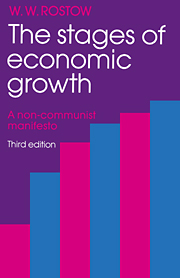Book contents
- Frontmatter
- Contents
- Preface to the Third Edition
- Preface to the Second Edition
- Preface to the First Edition
- 1 INTRODUCTION
- 2 THE FIVE STAGES-OF-GROWTH—A SUMMARY
- 3 THE PRECONDITIONS FOR TAKE-OFF
- 4 THE TAKE-OFF
- 5 THE DRIVE TO MATURITY
- 6 THE AGE OF HIGH MASS-CONSUMPTION
- 7 RUSSIAN AND AMERICAN GROWTH
- 8 RELATIVE STAGES-OF-GROWTH AND AGGRESSION
- 9 THE RELATIVE STAGES-OF-GROWTH AND THE PROBLEM OF PEACE
- 10 MARXISM, COMMUNISM, AND THE STAGES-OF-GROWTH
- Appendix A THE DIFFUSION OF THE PRIVATE AUTOMOBILE
- Appendix B THE CRITICS AND THE EVIDENCE
- Coda: REFLECTIONS ON THE DEBATE AS OF 1990
- Acknowledgments
- Index
6 - THE AGE OF HIGH MASS-CONSUMPTION
Published online by Cambridge University Press: 05 June 2012
- Frontmatter
- Contents
- Preface to the Third Edition
- Preface to the Second Edition
- Preface to the First Edition
- 1 INTRODUCTION
- 2 THE FIVE STAGES-OF-GROWTH—A SUMMARY
- 3 THE PRECONDITIONS FOR TAKE-OFF
- 4 THE TAKE-OFF
- 5 THE DRIVE TO MATURITY
- 6 THE AGE OF HIGH MASS-CONSUMPTION
- 7 RUSSIAN AND AMERICAN GROWTH
- 8 RELATIVE STAGES-OF-GROWTH AND AGGRESSION
- 9 THE RELATIVE STAGES-OF-GROWTH AND THE PROBLEM OF PEACE
- 10 MARXISM, COMMUNISM, AND THE STAGES-OF-GROWTH
- Appendix A THE DIFFUSION OF THE PRIVATE AUTOMOBILE
- Appendix B THE CRITICS AND THE EVIDENCE
- Coda: REFLECTIONS ON THE DEBATE AS OF 1990
- Acknowledgments
- Index
Summary
THE THREE-WAY CHOICE
Chapter 5 argues that, as technical maturity was approached, men began to take for granted what they were born to, in this case a well advanced industrial society; and their minds turned increasingly to reconsider the ends to which the mature economy might be put.
In a quite technical sense, the balance of attention of the society, as it approached and went beyond maturity, shifted from supply to demand, from problems of production to problems of consumption, and of welfare in the widest sense.
In this post-maturity stage there have been three major objectives which, to some degree, have competed for resources and political support, three directions in which welfare, in this wide sense, might be increased.
First, the national pursuit of external power and influence, that is, the allocation of increased resources to military and foreign policy. It has been a quite consistent feature of modern history for some groups to look out beyond their borders for new worlds to conquer, as their societies approached technical maturity. And in some cases, by one route or another, they gained effective political control over national policy.
A second direction for the use of the resources of a mature economy we can call the welfare state; that is, the use of the powers of the State, including the power to redistribute income through progressive taxation, to achieve human and social objectives (including increased leisure) which the free-market process, in its less adulterated form, did not achieve.
- Type
- Chapter
- Information
- The Stages of Economic GrowthA Non-Communist Manifesto, pp. 73 - 92Publisher: Cambridge University PressPrint publication year: 1991



